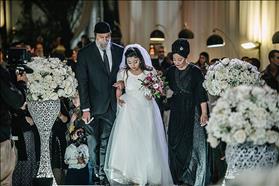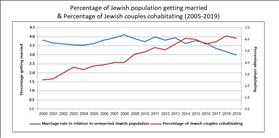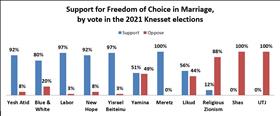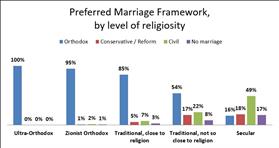When shall the government finally heed the overwhelming majority?
Contrary to Orthodox politicians - Public for marriage freedom
Last week, on the Jewish calendar, we marked Tu b’Av (the 15th day of the month of Av), which can be likened to Valentine’s Day in the USA. Hiddush commissioned a special survey on marriage freedom in commemoration of the holiday, which was well covered in the Hebrew and English media.
28/07/2021 23:02
Tags: Hiddush polls · Marriage · Marriage freedom · Tu b'Av

Jewish wedding in Israel, source: Wikipedia
Last week, on the Jewish calendar, we marked Tu b’Av (the 15th day of the month of Av), which can be likened to Valentine’s Day in the USA. Naturally, the media carried many references to the date in particular and to marriage in general. Hiddush commissioned a special survey in commemoration of the holiday, and it was well covered in the Hebrew and English media (see the Jerusalem Post, as an example). For long, we have considered the right to family a key building block of our mission and advocacy work; we have dedicated a special mini site to the dire need to advance marriage freedom in Israel.
The survey findings are consistent and unequivocal. Throughout Hiddush’s surveys of recent years, it has been amply clear that the overwhelming majority of Israeli Jews oppose the reality, in which Israel is the only western democracy that denies its citizens the right to marry. This compelling majority wants to see Israel live up to the ideals set out in its Declaration of Independence, promising freedom of religion & conscience and equality, regardless of religion, for all.
The details below will illustrate how that majority cuts across political and religious lines, as well as how the voters for all the parties making up the current coalition desire to see freedom of marriage legislated, not to mention most Likud voters. Most secular Jews who make up most of Israel’s Jewish population would have preferred to marry outside the Chief Rabbinate if that choice were only available to them.
The significance of highlighting these data is not only in the symbolic Jewish calendar date, but also – in the existing disconnection between the public’s will and the conduct of Israel’s politicians, which needs to be addressed. Hiddush is making efforts to enlist world Jewry for this task. Freedom of marriage is not only a core civil liberty that the State of Israel severely violates; it is also a vital interest along the path of enhancing Jewish unity and healing Israel-diaspora relations.
As we have pointed out in the past, it is sufficient to realize that most of the children born in the US Jewish community today, while eligible to make Aliyah under the Law of Return, would nevertheless be denied the right to marry should they attempt to get married in Israel, for the sole authority over the marriages of Jews in Israel was vested in the Orthodox Chief Rabbinate.
Thousands of Israeli couples annually choose to marry civilly overseas, many of whom do so because the Chief Rabbinate will not marry them, such as when a non-Orthodox or Modern Orthodox convert wants to get married, but among them there are also thousands of couples in which both spouses are Jewish by the Chief Rabbinate’s standards.
This disconnection between the public’s will and political action can be seen, for instance, in a misleading phrase recently used in two relevant public documents. We are referring to the key coalition agreement governing the conduct of Israel’s new government in the arena of religion & state and the State’s response to the pending petition, which demands that the registration of Utah online weddings in Israel’s Population Registry. Both documents attempt to rationalize the fact that marriage freedom is not legislated by stating that it requires ‘broad social consent’.
As far as excuses go, this is a pretty lame one; still, neither secular parties that are partners to the coalition, nor world Jewish leadership are strongly protesting it. Hiddush’s recurrent surveys, as well as other surveys that measure public support for marriage freedom, compelling refute this self-serving excuse. There is no need to wait for a future day when broad social support is found because such clear majority support already exists.
The ones who prevented it in the past were the parties representing the Orthodox minority and the civil parties on the right, center, and left, which were willing to sell off the civil liberties and human dignity of hundreds of thousands of Israeli citizens who are denied the right to marry altogether or denied the right to marry in accordance with their beliefs in return for a handful of political spoils.
As for the public, Israeli couples are responding with increasing cynicism and disdain, which was seen last week in a communique released by the governmental Central Bureau of Statistics on Tu b’Av. Thousands of Israeli couples annually choose to marry civilly overseas, many of whom do so because the Chief Rabbinate will not marry them, such as when a non-Orthodox or Modern Orthodox convert wants to get married, but among them there are also thousands of couples in which both spouses are Jewish by the Chief Rabbinate’s standards. These couples are making a conscientious choice to opt out of the Rabbinate’s monopoly and, therefore, need to seek marriage overseas.

Percentage of Israelis getting married and cohabitating (Central Bureau of Statistics) -
click for full sizeThe communique also reveals that over the course of recent years, there has been a consistent decline in the number of couples marrying via the Chief Rabbinate. At the same time, there has been a consistent rise in the number of Jewish couples opting for cohabitation without marrying at all (see the table below). This phenomenon can be explained by several factors; and the growing desire of Jewish couples not to fall into the hands of the Rabbinate in case they separate is chief among them.
As explained in the past, one of the most promising alternative avenues for Israeli couples wishing to marry civilly is the pioneering marriage platform created by Utah Country, Utah. Alas, this potential breakthrough was understood by the politicians in control of the Ministry of the Interior and the State’s Attorney Office. In the above-mentioned reply submitted to the Court this week, attempting to provide legal grounds for refusing to register Utah marriage certificates, they state that if Utah online weddings were to be registered, they could, in effect, transform and do away with the current legal monopoly held by the Chief Rabbinate – even without explicit legislation.
Hiddush survey for Tu b’Av
Half of Israeli Jewish public prefers to marry in non-Orthodox wedding ceremonies
The majority of Israeli Jews support legislation to grant freedom of marriage. Half the public would prefer to marry in non-Orthodox wedding ceremonies if it were legally possibility to do so, and among secular Israeli Jews, 84% express this preference.
63% of Israel’s Jewish public supports Israel recognizing all types of marriage, including civil, Conservative and Reform marriages. Among the secular public, the percentage of support is 90%. This emerges from a survey conducted by the Smith Institute for Hiddush - for Freedom of Religion and Equality, in advance of Tu b'Av. Hiddush has been monitoring the public's positions on the issue of freedom of marriage since its inception, and the latest poll again reinforces the conclusion that this is a consistent and stable majority since 2010, within the statistical margin of error. The government that finally implements marriage freedom will receive the public’s blessings.

Hiddush survey: Support for Marriage Freedom among Israeli Jews -
click for full sizeMost voters for the parties that comprise the coalition support freedom of choice in marriage: 92% of Yesh Atid voters, 97% of Labor voters, 80% of Blue & White voters, 100% of Meretz voters, 92% of New Hope voters, 97% of Yisrael Beiteinu voters, and 51% of Yamina voters. It should be noted that 56% of Likud voters also support it.
Another question asked in the survey was: Assuming that there was freedom of marriage in Israel, what framework would you choose for marriage? According to the survey findings, only 51% of the public would choose Orthodox marriages. 27% would choose civil marriage, 12% would choose Reform or Conservative marriage, and 10% responded that they would choose not to formally institutionalize their relationships. According to the data, only 16% of the secular Jewish public would voluntarily choose to marry in Orthodox wedding ceremonies, and about half of the secular public would choose civil marriage. The free choice of Orthodox marriage increases in relation to the respondents’ degree of religiosity.

Hiddush survey: Preferred marriage frameworks of Israeli Jews -
click for full sizeThe gender of the respondents also correlates to their responses. While 56% of men prefer Orthodox marriage, only 48% of women want it. The opposite preference can be seen in relation to Reform and Conservative marriages [preferred by 13% of women, but only 10% of men]. Another interesting statistic is the preference of 25% of immigrants from the former USSR to marry in Reform or Conservative marriage ceremonies if possible.
The survey also dealt with the issue of online "Utah marriage", which allows couples from all over the world to get married online by Zoom videoconferencing. More than 500 Israeli couples have already married in this way, and their marriages are recognized by the US authorities. Former Interior Minister Aryeh Deri instructed the Population Authority not to register such marriages and the current minister, Ayelet Shaked, refuses to cancel his order.
In the survey, participants were asked their opinion on the subject. According to the survey, 55% of the public supports the view that the Ministry of the Interior should register such marriages, just as it registers all official civil marriage certificates from foreign countries. Only 16% support the position expressed by the Population Authority to justify its refusal to register such marriages.
The Authority claims that as the couples did not actually leave the State of Israel to get married, they should be seen as having married in the country, and in Israel there is no legal alternative for civil marriage. Only 29% share the position of the political religious establishment, according to which the Ministry of the Interior should not register civil marriages of Israelis married abroad, because Israeli Jews should marry only according to religious Jewish law. 83% of the secular public supports the registration of Utah marriages, as does most of the public that intends to vote for the current coalition parties in the next election.
Following the findings of the survey, Hiddush emphasizes that in the new government, the possibility of the hoped-for revolution has presented itself, and Israel can finally enter the family of democratic nations in the world, in which marriage freedom is self-evident. In honor of Tu b'Av, the holiday of love, it is time for our politicians to allow love to be expressed in marriages of choice. By permitting this, they will show their loyalties not only to the values of the Declaration of Independence and Democracy, but also to those voters whose support they hope to enlist in the next elections.